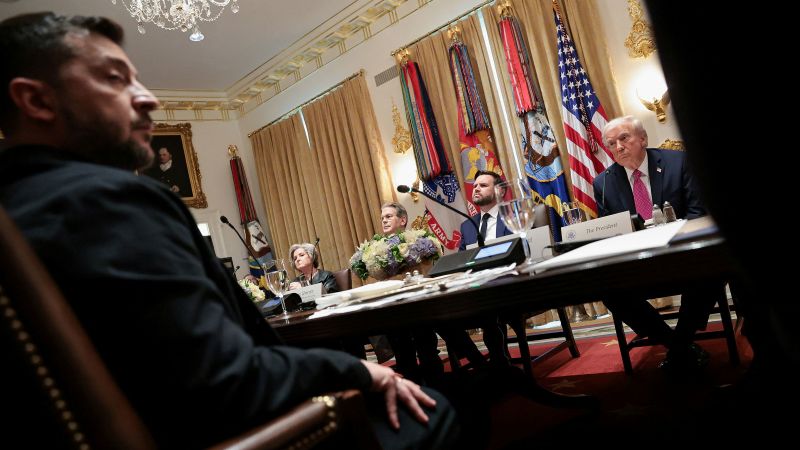Listen to the article
In a contentious White House meeting Friday, former President Donald Trump made several false claims during a press appearance with Ukrainian President Volodymyr Zelensky, including repeating a thoroughly debunked narrative about Russia’s 2022 invasion of Ukraine.
Trump claimed that Russia’s failure to capture Kyiv in the opening days of the war was due to a tactical error in which Russian forces chose to advance through muddy terrain rather than using highways. “They got stuck in the mud. They would’ve been in Kyiv very quickly. They were heading to Kyiv,” Trump said, adding, “That was a very interesting moment. When the tanks started rolling and some brilliant general said, ‘Let’s go through the mud instead of going down the highway.’ Right? So they got a little bit lucky.”
Military analysts and Ukrainian officials have consistently refuted this characterization since Trump began making similar assertions earlier this year. Rob Lee, a senior fellow in the Foreign Policy Research Institute’s Eurasia Program who has closely tracked the conflict, explained that Russian forces did in fact use roads and highways extensively during the initial invasion but faced multiple challenges.
“Russian forces used roads and highways as much as possible during the initial invasion, and took heavy losses on many of them,” Lee said. “Russian tanks did get stuck in the mud during the initial invasion, but this was often after they struggled to advance along roads.”
Lee pointed to a key strategic limitation facing Russian forces: “One of the factors that hindered Russia’s invasion is that there were not many good highways and roads leading from Belarus to Kyiv, which canalized their forces.”
When CNN previously sought comment from the White House regarding Trump’s claims, an official responded anonymously, acknowledging that Russian tanks did encounter mud issues during and before the invasion. However, one article provided by the official directly contradicted Trump’s narrative, stating, “The Russians invaded using Ukraine’s major highways expecting a blitzkrieg-like attack that would leverage speed and overwhelming firepower to capture the capital city of Kyiv.”
During the same press event, Trump repeated his claim of having “solved” or “ended” eight wars, a figure experts consider greatly exaggerated. He then made the historically inaccurate assertion that “to the best of my knowledge we’ve never had a president that solved one war. Not one war.”
This statement ignores numerous examples of U.S. presidents playing decisive roles in ending conflicts. Presidents have led the United States to victory in World War I, World War II, and the Gulf War. Additionally, several presidents have brokered significant peace agreements: Theodore Roosevelt won the Nobel Peace Prize in 1906 for mediating between Russia and Japan; Jimmy Carter facilitated the 1979 Egypt-Israel peace treaty; and Bill Clinton played a crucial role in the 1995 Dayton Accords that ended the Bosnian War.
Trump also repeated his longstanding claim that he provided Javelin anti-tank missiles to Ukraine while former President Barack Obama “gave them sheets.” While Trump did authorize Javelin deliveries that Obama had declined, the characterization of Obama’s aid is misleading. Between 2014 and 2016, the Obama administration provided more than $600 million in security assistance to Ukraine, including sophisticated counter-artillery radars, armored Humvees, tactical drones, night vision devices, and medical supplies.
Other false claims made during the press appearance included Trump’s repeated assertion that the 2020 election “was rigged” (independent analysis confirms Biden won a fair election), his claim that tariffs imposed on China brought “hundreds of billions of dollars” to the U.S. (studies show American importers and consumers bore most costs), and a fabricated story about Senator Mazie Hirono of Hawaii proposing a tunnel or railroad connecting Hawaii to the mainland.
The press appearance highlighted ongoing concerns about factual accuracy in Trump’s public statements regarding international affairs and American history.
Fact Checker
Verify the accuracy of this article using The Disinformation Commission analysis and real-time sources.




7 Comments
This is a good reminder of the importance of separating fact from fiction, especially when it comes to political rhetoric. While former President Trump may have his own narrative, the reality on the ground appears to be quite different based on the assessments of military experts and Ukrainian officials.
Agreed. It’s crucial that we seek out reliable, fact-based information from credible sources rather than simply accepting the claims of political figures, no matter their position or prominence. Rigorous fact-checking is essential in these matters.
Interesting analysis of the false claims made by former President Trump regarding the Russian invasion of Ukraine. It’s important to fact-check such statements and rely on military experts and Ukrainian officials for accurate information about the dynamics of the conflict.
The detailed refutation of Trump’s claims regarding the Russian invasion of Ukraine highlights the need for vigilance when it comes to evaluating political statements. It’s important to rely on authoritative sources and subject matter experts rather than unsubstantiated narratives.
The claim that Russian forces could have quickly reached Kyiv if they had taken a different tactical approach seems questionable. Military analysts have provided a more nuanced understanding of the challenges the Russian forces faced during the initial invasion. Fact-checking is crucial in these matters.
Absolutely, it’s important to get the facts right, especially when it comes to major geopolitical events like this. Relying on expert analysis rather than unsubstantiated claims is the best way to understand what actually happened.
This article provides a valuable lesson in the importance of critical thinking and fact-checking, especially when it comes to high-stakes geopolitical events. Relying on military analysts and Ukrainian officials seems like a much more reliable approach than accepting the claims of a former U.S. president.